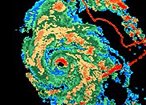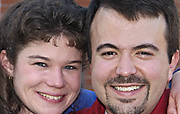
BY ERIK TRYGGESTAD
Tryggblog News Service
WASHINGTON — As the record-breaking hurricane season of 2005 comes to a close, meteorologists at the National Oceanic and Atmospheric Administration predict a record number of uses of the phrase “the perfect storm” during the post-hurricane season.
“The post-hurricane season is still weeks away, but we’re already seeing widespread instances of the phrase,” said Jared McTaggart, an NOAA statistician.
"If our computer models are correct, we could be seeing instances of 'the perfect storm' being referenced by stockbrokers on an almost daily basis by mid-December," he said.
"If this pattern holds, it's only a matter of time before Emeril Lagasse is whipping up 'the perfect storm' of wasabi and ginger sauce."
Earlier today, a guest biologist on National Public Radio’s Talk of the Nation referred to the Bush administration’s stance on intelligent design and proponents of evolution combining to form “the perfect storm of national education policy against scientific reality.”
McTaggart said this is only the beginning.
“We’re predicting that 'the perfect storm' will be used to describe everything from conflicts in the Middle East to toilet clogs in the suburbs of Philadelphia.”
Climatologists and linguists predict that the number of out-of-context uses of the phrase this year could match or exceed the number five years ago, when the film The Perfect Storm debuted in cinemas across the country.
The star-studded vehicle for actors George Clooney and Mark Wahlberg, based on the nonfiction novel by Sebastian Junger, tells the story of a complex series of meteorological events that coincided to produce an intensely powerful storm off the coast of Gloucester, Mass.
But Gary Scoffield, professor of linguistics at George Mason University, Fairfax, Va., said that allusions made to “the perfect storm” this season will have little, if anything, to do with the tragic events of 1991 that claimed the crew of the Andrea Gail.
“The other day I heard one of my students refer to a blind date her friend set her up on as ‘the perfect storm,’” Scoffield said.
“Curious, I probed for details, wondering what social and economic factors could have combined to cause her to equate her experience with a weather event that has happened only once in recorded history.
“She stared at me blankly and replied, ‘He took me to Red Lobster and told me not to order anything over 12 bucks.’ It was clear she had no understanding of the universal archetypes referenced in the syntax of 'the perfect storm.' Nor could she spell 'archetype' when I asked her.”
Scoffield and McTaggart agreed that the 2005 hurricane season, with no less than 23 named storms, will contribute greatly to overuse of the phrase in the post-hurricane season.
“Images of destruction from hurricanes Katrina, Rita, Wilma and Beta are still fresh on the minds of the American public,” McTaggart said. “As a society, we often cope with disaster by turning it into a catch phrase and saying it over and over again. That’s why people are continuing to say ‘How you doin’?’ — to cope with the absolute disaster of Joey, the ill-fated Friends spin-off.”
Scoffield added, “It’s as if the news of the hurricanes and the desire to sound intelligent — yet not afraid to tip one’s hat to pop culture — have combined to form the ‘perfect storm’ of phrasal over-usage.”
Unlike the current trend in tropical storms, however, experts predict that the verbal affectation will last only until it’s replaced by another kitschy-yet-academic nod to Hollywood.
“By this time next year, we could be looking at a highly active season of people ending their conversations with ‘Good night and good luck,’” McTaggart said.


No comments:
Post a Comment